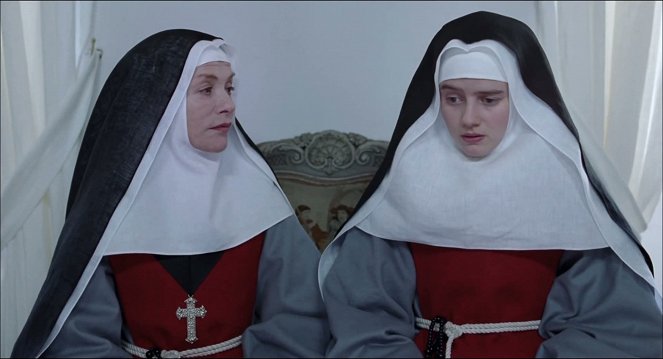Rendező:
Guillaume NiclouxForgatókönyvíró:
Guillaume NiclouxOperatőr:
Yves CapeZeneszerző:
Max RichterSzereplők:
Isabelle Huppert, Louise Bourgoin, Martina Gedeck, Agathe Bonitzer, Marc Barbé, Pauline Etienne, Gilles Cohen, Pascal Bongard, François Négret (több)Tartalmak(1)
Az 1760-as évek Franciaországában egy ártatlan és életvidám lányt szülei kolostorba kényszerítenek. Suzanne (Pauline Etienne átütő alakításában) minden erejével lázad a fiatalság, a nőiség és az élet törvényeivel szemben álló rabság ellen. A korabeli egyház nem nézi jó szemmel a lány szabadulási törekvéseit, és nyers szadizmussal próbálja letörni azt: Suzanne-nak a zárda nővéreinek megaláztatásaival és szexuális erőszakoskodásával kell megküzdenie. (Mozinet)
(több)Videók (6)
Recenziók (2)
The filmography of director Nicloux does not exactly inspire great trust, and among his undeniable escapades and sins there is, among others, the unforgettable film Blanche, so I approached his new work with caution. Fortunately, that was unnecessary. The Nun is not a complete failure. It has good camera work, and I accept the cast without reservation. On the other hand, Nicloux is not very inventive in depicting the complex psychology of his characters, the main protagonist simply suffers, and life in the convent and its position in society is reduced to Suzanne's desperate attempt to escape the cage. The pace of the story corresponds to the slow and stereotypical life in the convent. The portrayal of the lesbian superior and her desire for the main protagonist is caricatured in Isabelle Huppert's performance, and I dare to say that was definitely not Nicloux's intention. Diderot's book had an important role in awakening the social elites during the Enlightenment and setting requirements for personal freedom of decision-making. Today, we have different struggles and live with different problems, so I feel that the depicted world bound by strict religious rules and based on a strictly religious view of the world will be distant, unpleasant, and incomprehensible to the current generation. And there is one more thing I should not forget. Suzanne never stopped being a member of the nobility, i.e., a narrowly defined privileged class. As mentioned in the film, poverty is terrible and a huge number of women at that time would gladly have exchanged their hunger and toiling in the fields for a fancy stay behind the walls. Freedom was still a very luxurious commodity in the 18th century, completely inaccessible to the overwhelming majority of the population. Religious supervision, arranged marriages, uncompromising social rules, serfdom, etc., together created a world that was no friendlier or freer than the one in the convent. Overall impression: 60%.
()
I more or less understand why this movie has such a mediocre rating on this website. The Nun is a fairly quiet movie and the composer Max Richter is obviously an amazing composer of silence, although I must admit that he composes stellar movie soundtracksotherwise. But this time, I had to be won over by the actors and especially the camerawork which – in my opinion – was outright outstanding. I enjoyed all the footage of French convents and the landscapes that were only made more powerful with silence – which is something the movie didn’t shy away from. And all of that connected with a rebellious nun who still wasn’t rebellious enough for today’s standards. But what can you do, she was properly shocking for her time and I can’t rate it any lower than four stars, because this catharsis of Christianity at that timewas simply captivating.
()



Hirdetés